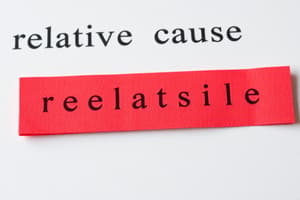Podcast
Questions and Answers
In the sentence 'She is the author whose books have won many awards.', what type of relative clause is being used?
In the sentence 'She is the author whose books have won many awards.', what type of relative clause is being used?
- Nonrestrictive relative clause
- Object relative clause
- Subject relative clause (correct)
- Object relative clause with preposition
Which of the following words can be used as relative pronouns for restrictive relative clauses?
Which of the following words can be used as relative pronouns for restrictive relative clauses?
- When
- Who (correct)
- Where
- Why
Which of the following words can be used in nonrestrictive relative clauses to refer to specific times or place names?
Which of the following words can be used in nonrestrictive relative clauses to refer to specific times or place names?
- Why
- Where
- Whose
- When (correct)
Based on the text, what word can follow place, street, city, and situation in a restrictive relative clause?
Based on the text, what word can follow place, street, city, and situation in a restrictive relative clause?
Which of the following correctly shows the formal usage of 'which' in a sentence?
Which of the following correctly shows the formal usage of 'which' in a sentence?
What is the correct form of object relative clause usage in the sentence 'I know the reason why the workers went on strike.'?
What is the correct form of object relative clause usage in the sentence 'I know the reason why the workers went on strike.'?
In what type of relative clause does 'J.K.Rowling, whose books are all bestsellers, donates a lot of money to charity.' fall into?
In what type of relative clause does 'J.K.Rowling, whose books are all bestsellers, donates a lot of money to charity.' fall into?
'Whose shows a possessive relationship between the nouns before and after it.' What type of clause is being explained here?
'Whose shows a possessive relationship between the nouns before and after it.' What type of clause is being explained here?
'Where follows words like place, street, city, and situation.' Which kind of information is this sentence providing?
'Where follows words like place, street, city, and situation.' Which kind of information is this sentence providing?
What kind of information can 'whose', 'when', and 'where' provide in nonrestrictive relative clauses?
What kind of information can 'whose', 'when', and 'where' provide in nonrestrictive relative clauses?
Flashcards are hidden until you start studying
Study Notes
Relative Pronouns
- When a preposition is placed before a relative pronoun, whom or which must be used to create a more formal tone.
Object Relative Clauses
- In object relative clauses, the relative pronoun can be omitted with no change in meaning.
- This is also true for object relative clauses ending with prepositions.
- Omitting the relative pronoun is common in everyday speech.
- When there are two object relative clauses in a row, the first relative pronoun is usually omitted, but the second one cannot be omitted.
- You cannot drop the relative pronoun in subject relative clauses.
Restrictive vs. Nonrestrictive Relative Clauses
- Restrictive relative clauses provide essential information about the noun they modify.
- Nonrestrictive relative clauses provide additional information about the noun they modify.
- Examples:
- Restrictive: My sister who lives in New York works for Donald Trump.
- Nonrestrictive: My sister, who lives in New York, works for Donald Trump.
Relative Pronouns Usage
- Who is used to refer to people.
- Which is used to refer to things.
- That can refer to either people or things.
- Whom can be used instead of who to convey a more formal tone.
- Which and who usually sound more formal and are often used in writing.
Relative Clauses with Prepositions
- The relative pronoun takes the place of the object of a preposition.
- The relative pronoun is followed by a subject and a verb.
- The verb agrees with the subject.
- The preposition usually appears at the end of the clause, but can also be put before the relative pronouns which or whom.
Studying That Suits You
Use AI to generate personalized quizzes and flashcards to suit your learning preferences.



